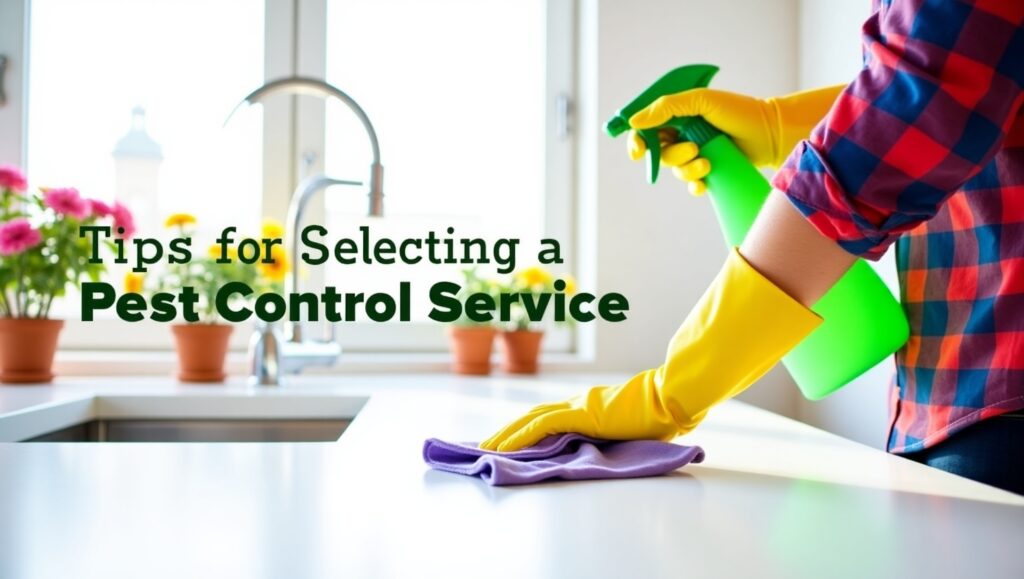Pests can damage your property, threaten your health, and become expensive if left untreated.
The right provider makes all the difference—but how do you know which company to trust?
Here are practical, research-backed tips for selecting a pest control service that help you make the safest and smartest choice.
1. Take Your Time — Don’t Rush
One of the most overlooked tips is to avoid rushing into a decision.
Get multiple quotes before choosing.
Comparing providers gives you time to evaluate credentials, prices, and services.
Quick, pressured decisions often lead to poor results or hidden costs.
2. Verify Licensing and Certification
The most important tip for choosing a pest control service is to check licensing.
Licensed companies meet state requirements, follow regulations, and hire trained technicians.
Ask for:
-
Proof of licensing
-
Technician certification
-
Product labels for pesticides being used
This protects your family and ensures safe, effective treatment.
3. Ask for a Property Inspection
A trustworthy pest control company will inspect before recommending treatment.
An inspection helps identify:
-
Type of pests
-
Level of infestation
-
Entry points and conditions causing the problem
If a company tries to sell treatments without inspection, consider it a red flag.
4. Review Experience and Reputation
Another critical tip for selecting pest control services is to check track records.
Reliable providers have years of experience and a proven history with local pests.
Ways to check reputation:
-
Read online reviews on Google and BBB
-
Ask neighbors for referrals
-
Check state regulatory offices for complaints
5. Compare Treatment Methods
Not all pest control is the same.
Some companies rely heavily on chemicals, while others use eco-friendly pest control or Integrated Pest Management (IPM).
Ask questions like:
-
Are treatments safe for children and pets?
-
Do you provide green or reduced-chemical options?
-
How do you prevent pests from returning?
A good company is transparent about their process.
6. Ask About Insurance and Guarantees
A professional pest control company should carry liability insurance.
This covers accidental damage during service.
Also, ask about service guarantees. Many companies offer free re-treatments if pests return within a certain period.
This shows confidence in their work.
7. Compare Pricing Carefully
Price matters, but the cheapest pest control service is not always the best.
Low-cost providers may cut corners or use unsafe chemicals.
Tips for comparing pricing:
-
Always get written estimates
-
Check what’s included (initial treatment, follow-ups, warranty)
-
Focus on value—not just the lowest cost
8. Ask Smart Questions
One of the most effective tips for selecting a pest control service is to ask detailed questions before signing a contract.
Good examples include:
-
How long have you been in business?
-
What types of pests do you specialize in?
-
What safety steps do you follow?
-
Do you offer follow-up inspections?
-
Is there a warranty or guarantee?
Clear answers build trust.
9. Watch for Red Flags
Some companies rely on high-pressure sales tactics or vague promises.
Avoid pest control providers who:
-
Refuse to show proof of licensing
-
Avoid explaining treatment methods
-
Push long contracts without details
-
Have consistent negative reviews
If it feels suspicious, trust your instincts.
10. Consider Eco-Friendly Options
Many homeowners prefer green pest control solutions that minimize chemical use.
Eco-friendly methods focus on prevention, safe products, and long-term solutions.
They are effective, safer for children and pets, and better for the environment.
11. Evaluate Customer Service
Professionalism matters.
A reliable company will:
-
Communicate clearly
-
Show up on time
-
Provide education on preventing pests
Customer service often reflects the quality of their work.
Final Thoughts: Tips for Selecting a Pest Control Service
The best pest control company is safe, transparent, and reliable.
By following these tips for selecting a pest control service—from checking licenses to asking smart questions—you can protect your property and your family.
Frequently Asked Questions (FAQs)
Q1: What are the most important tips for selecting a pest control service?
The most important tips include checking if the company is licensed, asking for an inspection before treatment, comparing multiple providers, and reviewing their reputation through online reviews and references. A reliable pest control company will also explain their treatment methods clearly, provide a written estimate, and offer some form of guarantee or warranty for their services.
Q2: Why is licensing such a big deal when choosing pest control?
Licensing ensures that technicians have proper training and meet state or federal regulations for pesticide use. Hiring an unlicensed company can put your family, pets, and property at risk because unsafe or illegal chemicals may be used without proper safety protocols.
Q3: Should I choose the cheapest pest control option?
Going with the cheapest option can sometimes cost more in the long run because lower-cost services may use ineffective treatments or fail to address the root cause of infestations. It’s better to focus on value—making sure the company provides safe, effective, and long-lasting solutions—rather than just the lowest upfront price.
Q4: What red flags should I avoid when hiring a pest control company?
Be cautious if a company refuses to provide proof of licensing, avoids explaining their treatment process, or pressures you into signing a long-term contract without clear details. Negative reviews, vague answers, and overly cheap pricing can also be warning signs that the provider is not trustworthy.
Q5: Are eco-friendly pest control options effective?
Yes, eco-friendly pest control methods such as Integrated Pest Management (IPM) are highly effective and focus on prevention, safe treatment options, and long-term solutions. They minimize chemical use, making them safer for children, pets, and the environment while still delivering results against common pests.
Q6: How do I confirm a pest control company is reliable?
Start by reading verified customer reviews and asking for local referrals. Then, confirm that the company is licensed, insured, and willing to provide a written contract with details about services, pricing, and guarantees. A trustworthy pest control provider will also answer your questions openly and offer follow-up support if needed.
Q7: What are the tips for pest control?
Some of the best tips for pest control at home include sealing cracks and entry points, keeping food stored properly, fixing moisture issues, and scheduling regular inspections. Professional tips also emphasize prevention, since stopping pests before they spread is often easier and cheaper than treating a large infestation.
Q8: How to select an exterminator?
To select an exterminator, start by checking their license, experience, and reviews from past customers. Always ask for an on-site inspection before treatment, get a written estimate, and make sure they explain the methods and products being used for your safety and peace of mind.
Q9: How to choose the right pest control company?
The right company will be licensed, insured, and have proven experience with the type of pest you’re dealing with. It’s also important to compare several providers, look for service guarantees, and ensure that the company communicates clearly and treats customers professionally.
Q10: What is the most important step in pest control?
The most important step in pest control is proper identification of the pest problem. Without knowing the exact type of pest, level of infestation, and conditions causing it, treatments may fail. A thorough inspection ensures that the right methods are applied for safe and lasting results.
Q11: What time of year is best for pest control?
Spring and early summer are often the best times for pest control because pests are most active during warmer months and can be stopped before infestations grow. However, pest control is beneficial year-round since different pests—like rodents in winter or ants in summer—emerge in different seasons.







